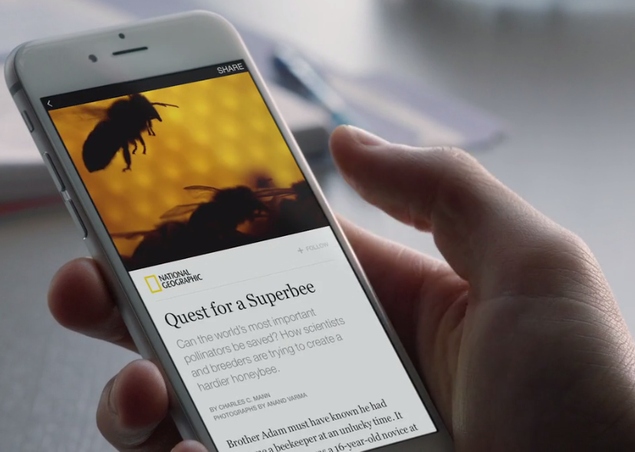- Home
- Apps
- Apps Opinion
- Facebook Instant Articles and the Slow Death of an Open Web
Facebook Instant Articles and the Slow Death of an Open Web

Facebook's latest attempt at making its app experience fast and seamless sees the social network turn publisher for news websites. Facebook Instant Articles, a feature that is restricted to its iPhone app for now, aims to reduce the long loading time when you open articles on a Web browser.
Facebook says that making people wait for an article to load results in an incredibly poor experience on mobile. If people are tapping on links that don't load properly, they might exit Facebook, or open the link in their browser, leaving the app - and of course, that will mean less time spent on Facebook - something the social network is keen to avert. Facebook's solution involves hosting the content itself - so that it loads instantly.
Facebook achieves faster loading by pre-loading articles as you scroll your News Feed. Because the article has already been loaded in the background, pictures pop up instantly when you tap the link, and embedded videos start playing the moment you scroll down to them. Compare that with opening an external link from Facebook.
First, Facebook will try and open the link in the in-app browser, which takes some time, and often won't display everything correctly. If that isn't loading properly, you can open the page in your browser app, which takes time to open. Then you wait for the article to load, which takes some time as well, since none of this content has been cached, and there are going to be ads and trackers aside from the article itself. Facebook says this process takes up to eight seconds, which is a pretty long waiting time, especially on mobiles. Facebook Instant Articles loads content in a fraction of that time.
This means that you can read entire articles without leaving the Facebook app. The service also has some cool features such as video covers for articles (autoplaying videos on the News Feed), tilting your phone to pan a picture, a beautiful layout, and publishers' logo showing up at the top of each article with a Follow button that lets people follow their Facebook page. These extra features might even make the stories more noticeable, and more engaging, helping publishers.
But these articles need to be published separately, which adds a little work on the publishers' end. Tweaking features for Facebook Instant - such as coming up with a video cover - will add to the work involved as well. Also, at the moment only a select few publishers can create Facebook Instant Articles; launch partners include some of the biggest sites in the world such as The New York Times, The Guardian, BBC News and BuzzFeed. These publishers can choose which of their posts are best published as Instant Articles, so don't expect all of their posts to load instantly. This means - if Instant Articles becomes popular - a small publisher could find it harder to be noticed than ever.
Not only could this give publishers a better chance of reaching Facebook users, but the traffic they get through Facebook Instant Articles is also counted towards their site by comScore and other analytics tools. As of now, publishers can even keep 100 percent of the advertising revenue should they choose to serve their own ads. This sounds like a great idea for many publishers, especially those who may not have beautiful websites.
The catch
At this point, things might start to sound win-win for everyone, but Facebook has long been trying to create a walled garden, locking you into its ecosystem. It doesn't want people to leave its apps and websites - where they can be monetised - and it's important to remember that this feature has been built to ensure that people don't have to leave the Facebook app, rather than to provide publishers with a platform to reach a bigger audience.
Not having to use multiple apps or going to multiple websites to get your daily news and updates is a good thing for users, but publishers need to find ways to avoid relying too heavily on Facebook's traffic. People are far more likely to use the Facebook app, which shows the most popular news articles in one place, than multiple news apps. If the articles load up without the person having to leave the Facebook app - that's even better for the reader. However, the time and energy invested in creating Facebook Instant Articles may not pay off in the long run. Quite a few websites have started getting more referral traffic from Facebook than Google. This puts Facebook in a position of dominance and leaves publishers at the mercy of its algorithms.
Changes to Facebook's algorithms have limited the organic reach for brands' Facebook pages. If your friends like or comment on brands' posts, the chances of you seeing them are quite low, leaving them with only one option - pay to boost reach on Facebook. Right now, news publishers' posts are valued by Facebook, and the social network has been slowly increasing their visibility. But much like other brands, publishers could also become highly dependent on Facebook, and then left with no option but to pay.
To be on Facebook Instant Articles, you have to play by its rules. As of now, the social network has said that it won't prioritise Instant Articles in the News Feed, but if more people click on these stories - something that the eye catching design hopes to accomplish - then they will see more such articles, and fewer links away from Facebook. The algorithm is remorseless, and publishers could well end up dependent on Facebook.
At that point, Facebook could take any number of steps, such as charging a fee for all advertisements served through Facebook Instant Articles, or prioritising certain types of content, and censoring other articles. Conspiracy theorists would even say that Facebook could use that dependence to suppress negative coverage related to the company.
Dividing up the Internet
This is the latest in a series of developments that make us wonder if the days of an open Web are numbered. Initiatives such as Internet.org and Facebook Instant Articles try to lock people into the company's Internet of walled gardens. There are too many websites on the Internet for any new blog to hope for significant growth via direct traffic. Traditional channels of getting traffic - search engines and social networks - are being dominated by those willing to pay for visibility. Google's decision to add Knowledge Graph answers, some of which are ads, to the top of search results is another symptom of this trend. Corporates such as Facebook and Google are trying their best to ensure that you never leave their apps or websites.
Soon we're going to reach a stage where the Web for most people will just be a few apps owned by some giant companies. Publishers will have to depend on the giants for revenue. The few that can afford to do this will thrive while others are likely to fall by the wayside.
Get your daily dose of tech news, reviews, and insights, in under 80 characters on Gadgets 360 Turbo. Connect with fellow tech lovers on our Forum. Follow us on X, Facebook, WhatsApp, Threads and Google News for instant updates. Catch all the action on our YouTube channel.
Related Stories
- Samsung Galaxy Unpacked 2026
- iPhone 17 Pro Max
- ChatGPT
- iOS 26
- Laptop Under 50000
- Smartwatch Under 10000
- Apple Vision Pro
- Oneplus 12
- OnePlus Nord CE 3 Lite 5G
- iPhone 13
- Xiaomi 14 Pro
- Oppo Find N3
- Tecno Spark Go (2023)
- Realme V30
- Best Phones Under 25000
- Samsung Galaxy S24 Series
- Cryptocurrency
- iQoo 12
- Samsung Galaxy S24 Ultra
- Giottus
- Samsung Galaxy Z Flip 5
- Apple 'Scary Fast'
- Housefull 5
- GoPro Hero 12 Black Review
- Invincible Season 2
- JioGlass
- HD Ready TV
- Latest Mobile Phones
- Compare Phones
- AI+ Pulse 2
- Motorola Razr Fold
- Leica Leitzphone
- Samsung Galaxy S26+
- Samsung Galaxy S26 Ultra
- Samsung Galaxy S26
- iQOO 15R
- Realme P4 Lite
- Asus TUF Gaming A14 (2026)
- Asus ProArt GoPro Edition
- Lenovo Idea Tab Pro Gen 2
- Lenovo Legion Tab (2026)
- Huawei Watch GT Runner 2
- Amazfit Active 3 Premium
- Xiaomi QLED TV X Pro 75
- Haier H5E Series
- Asus ROG Ally
- Nintendo Switch Lite
- Haier 1.6 Ton 5 Star Inverter Split AC (HSU19G-MZAID5BN-INV)
- Haier 1.6 Ton 5 Star Inverter Split AC (HSU19G-MZAIM5BN-INV)

















